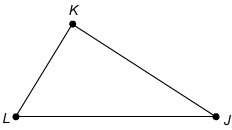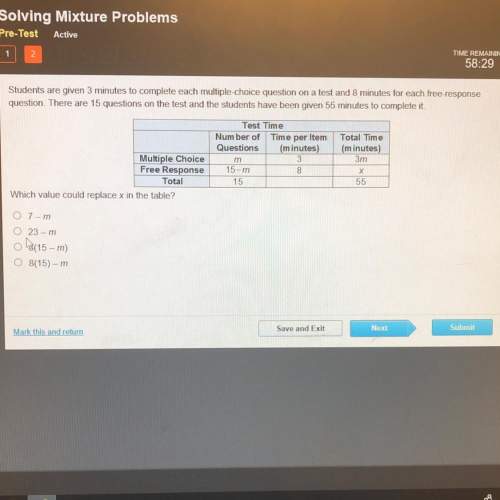Which side is the included side for jkl and klj ?
jk
kl
jl
...

Mathematics, 30.11.2019 17:31, gujacksongu6
Which side is the included side for jkl and klj ?
jk
kl
jl


Answers: 3
Other questions on the subject: Mathematics

Mathematics, 20.06.2019 18:04, Jasmineemarieee
Beatrice decides she wants to babysit a few children at the same time to earn the money faster. she tells parents that if they allow her to babysit their children at her house, she will eliminate her automatic $5 tip and will give them an additional $5 discount. (a) write an equation showing the total cost for each client. identify all variables. (b) four parents bring their children to beatrice’s house at the same time for babysitting. beatrice wants to find out how many hours she must babysit the 4 children to earn exactly the $100 she needs in order to buy the present for her mother. write and solve an equation to find the number of hours. justify each step in the solution. (c) one parent decides not to drop off her child. the remaining 3 parents drop their children off at 9 a. m. two of the parents say they will be back at 1 p. m. the third parent says she will pick up her child at 2 p. m. at noon, beatrice realizes she needs feeding the 3 ch
Answers: 2

Mathematics, 21.06.2019 13:30, kaylatunell123
Lindsay is creating a bridge out of dried pasta and glue. in her plans, she sketches the graph to determine the lengths of the noodles, in centimeters, needed for the arch to increase the length of the bridge in 1 centimeter increments. which function did lindsay use to create her design? f(x) = (x – 5)2 + 8 f(x) = –(x + 5)2 + 8 f(x) = 0.5(x + 5)2 + 8 f(x) = –0.5(x – 5)2 + 8
Answers: 1

Mathematics, 21.06.2019 20:30, maxy7347go
Does the function satisfy the hypotheses of the mean value theorem on the given interval? f(x) = 4x^2 + 3x + 4, [−1, 1] no, f is continuous on [−1, 1] but not differentiable on (−1, 1). no, f is not continuous on [−1, 1]. yes, f is continuous on [−1, 1] and differentiable on (−1, 1) since polynomials are continuous and differentiable on . there is not enough information to verify if this function satisfies the mean value theorem. yes, it does not matter if f is continuous or differentiable; every function satisfies the mean value theorem.
Answers: 1

Mathematics, 21.06.2019 21:00, manasangreddy2921
Simplify -4z+2y-y+-18z a.-22z+y b.-14z+2 c.3y+22z d. y +14z
Answers: 1
Do you know the correct answer?
Questions in other subjects:



History, 03.02.2020 16:50

History, 03.02.2020 16:50

Mathematics, 03.02.2020 16:50

Mathematics, 03.02.2020 16:50

Geography, 03.02.2020 16:50


Mathematics, 03.02.2020 16:50








